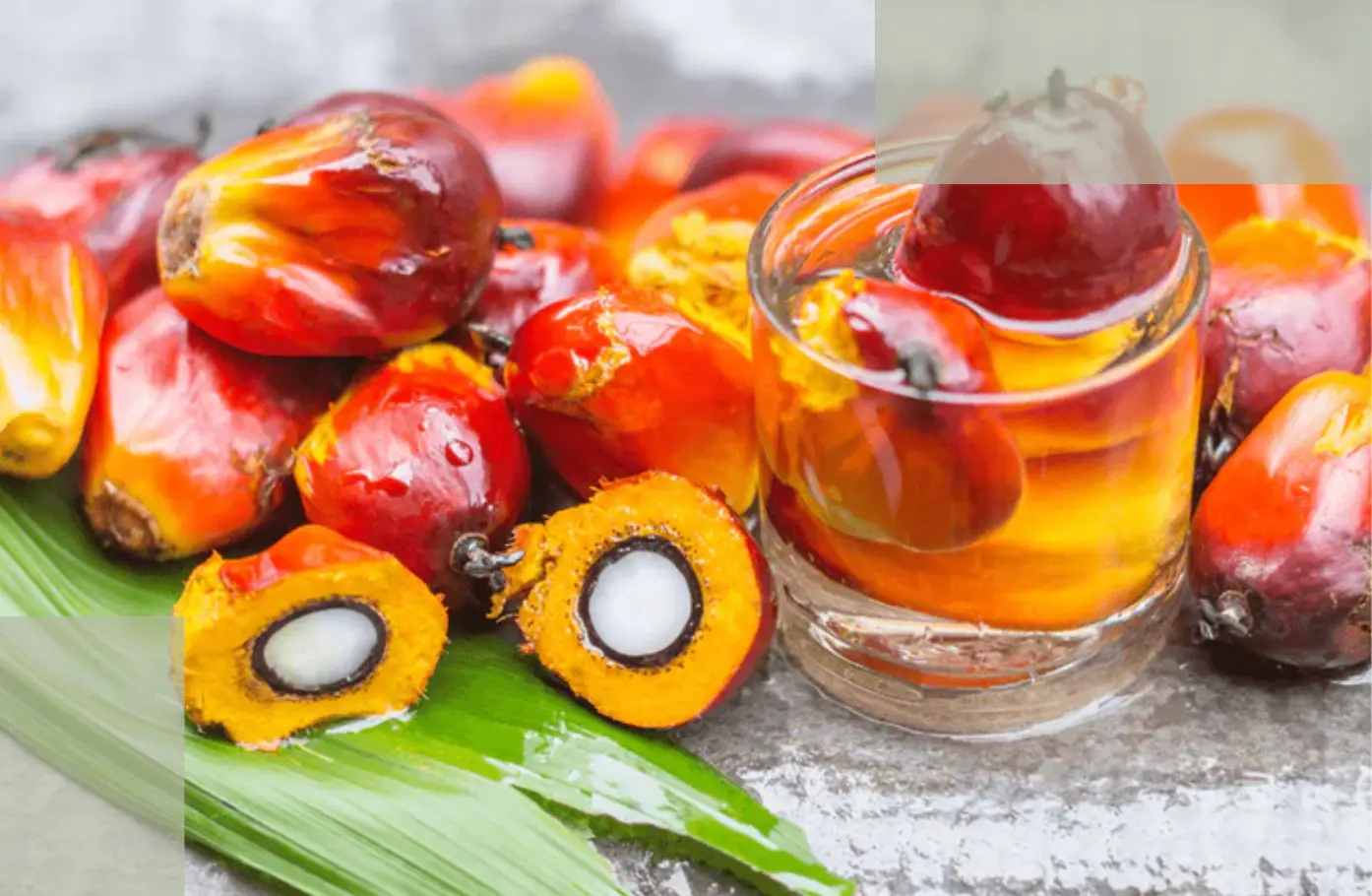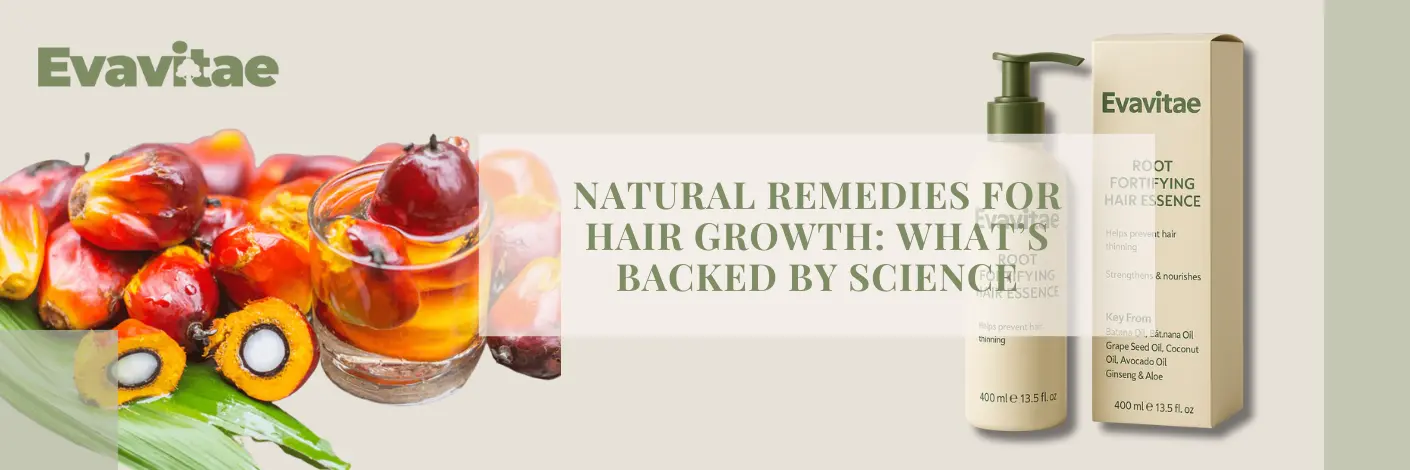
Hair loss and slow hair growth affect people of all ages and genders. While commercial treatments can be effective, many are turning to natural remedies to support scalp health and stimulate hair growth—methods that often feel gentler, more sustainable, and less invasive. But which of these traditional practices are actually supported by science?
Let’s explore some of the most well-researched natural approaches to improving hair growth, with a special focus on one standout ingredient: Batana oil, a deeply nourishing oil derived from the American palm tree, Elaeis oleifera.
🌿 Why Natural Remedies Matter
Natural remedies for hair growth—like plant oils, herbal extracts, and nutritional strategies—are often rich in bioactive compounds. These compounds may:
- Promote blood flow to the scalp
- Provide anti-inflammatory benefits
- Strengthen the hair shaft
- Support follicle health
Unlike many pharmaceutical treatments, natural methods tend to pose fewer side effects, making them appealing to those with sensitive skin or a desire for holistic wellness.
🛢️ Batana Oil: A Traditional Secret with Modern Promise
One of the most promising natural oils for hair growth is Batana oil, traditionally used by the indigenous Miskito people of Honduras, often referred to as the “Tawahka people.”
This reddish-brown oil is extracted from the nuts of the Elaeis oleifera palm and is packed with:
- Tocotrienols (a potent form of vitamin E)
- Essential fatty acids
- Carotenoids and antioxidants
✨ How Does Batana Oil Work?
- Nourishes follicles: Its rich fatty acid content deeply penetrates the scalp, improving moisture retention and follicle health.
- Reduces breakage: Batana oil coats each hair strand, reducing damage and improving texture.
- Soothes inflammation: Antioxidants in the oil help calm inflammation, which may interfere with healthy hair cycles.
A small 2022 review published in Cosmetics found that tocotrienols may significantly increase hair count in individuals with alopecia (Nguyen et al., 2022). Batana oil is one of the few natural sources of these powerful compounds.
🧴 Gentle tip: For best results, apply Batana oil to the scalp 1–2 times per week and massage it in with fingertips. Leave on for at least 30 minutes before rinsing with a sulfate-free shampoo(try Evavitae).
🍃 Other Natural Remedies Backed by Science
1. Rosemary Oil
Rosemary oil has been shown to be as effective as minoxidil in promoting hair growth in some studies (Panahi et al., 2015). It increases scalp circulation and may help reduce DHT, the hormone linked to hair thinning.
Rosemary-based treatments have gained popularity, but not all approaches offer the same results. For a deeper look into their safety and effectiveness, see our article on whether rosemary water is enough for hair growth and why a safer, smarter approach may work better.
Note: Rosemary oil is potent and may irritate sensitive scalps. Always dilute before use.
2. Peppermint Oil
A study in Toxicological Research (2014) found that peppermint oil led to significant hair growth in mice, even outperforming minoxidil (Oh et al., 2014). It stimulates blood flow and invigorates the scalp.
3. Aloe Vera
Aloe contains proteolytic enzymes that help break down dead skin cells and unclog hair follicles. It’s also soothing for itchy, inflamed scalps.
🧠 Nutrition: The Foundation of Hair Health
Topical care is only one part of the picture. Without the right nutrients, your follicles won’t have the fuel they need to grow strong, resilient strands. Essential vitamins and minerals include:
- Biotin (Vitamin B7): Helps with keratin production
- Iron: Prevents telogen effluvium (sudden hair shedding)
- Zinc: Plays a role in follicle repair
- Vitamin D: Deficiency has been linked to alopecia areata
- Protein: The literal building block of hair (keratin)
📌 External Reference: The Cleveland Clinic (2023) emphasizes the importance of iron and vitamin D in preventing female pattern hair loss. Link
Natural remedies can improve scalp health, but internal nutrition remains essential for sustainable results. Learn more in our article on hair growth vitamins and the science of nutritional support for regrowth.
✋ Lifestyle Practices That Make a Difference
Natural remedies are most effective when paired with healthy habits:
- Scalp massage: Stimulates circulation, enhancing nutrient delivery
- Stress management: Chronic stress can disrupt the hair growth cycle (Sapolsky, 2020)
- Adequate sleep: Nighttime is when repair and regeneration peak
- Limiting heat and harsh chemicals: Protects already fragile hair
Try this: Use your fingertips to massage Batana oil into the scalp in small, circular motions for 5–10 minutes. It’s relaxing and good for growth(you can also use Evavitae essential oils here).
💡 What to Avoid in Natural Hair Growth
While natural approaches can be effective, some are overhyped or not suitable for all scalps:
- Undiluted essential oils: Can burn or sensitize the skin
- DIY treatments with raw onion or garlic: May be too irritating
- Overuse of coconut oil: Heavy oils can clog pores on fine or oily scalps
Try Evavitae essential oils for their healthy, effective ingredients, direct application, time-saving, and gentle properties.
💧 Batana Oil vs Other Popular Oils: What Sets It Apart?
While coconut, argan, and castor oils are commonly used for hair care, Batana oil offers a unique profile that makes it especially beneficial for those experiencing hair thinning or scalp sensitivity:
Oil Type | Key Benefit | Texture / Suitability |
Batana Oil | Deeply restorative, antioxidant-rich | Medium weight, good for most |
Coconut Oil | Moisturizing, anti-fungal | Heavy, may clog pores for some |
Castor Oil | Promotes thickness | Very thick, best diluted |
Argan Oil | Adds shine, reduces frizz | Lightweight, styling-friendly |
Batana oil is often referred to as the “miracle oil” by those who’ve experienced regrowth or reduced breakage after incorporating it. Unlike many natural oils that simply coat the hair, Batana oil penetrates the shaft and nourishes the scalp, making it a dual-action remedy.
🧴 How to Use Batana Oil in Your Routine
Integrating Batana oil into your regimen doesn’t require drastic changes. Here are a few easy methods:
- Pre-wash treatment: Apply oil generously to the scalp and lengths, massage for 5–10 minutes, and leave on for 30–60 minutes before shampooing.
- Overnight treatment: For intensive repair, leave the oil on overnight (protect pillow with a towel or cap).
- Mixed with conditioner: Add a few drops to your regular conditioner for extra nourishment.
For best results, use it 1–2 times a week. Always choose cold-pressed, unrefined Batana oil to retain the highest level of nutrients.
🔬 Batana Oil and Sensitive Scalps
Those with eczema, seborrheic dermatitis, or post-chemotherapy scalp irritation often shy away from oils fearing residue or irritation. However, Batana oil’s natural anti-inflammatory properties make it one of the few oils well-tolerated by sensitive scalps.
It’s free of fragrance, artificial additives, or allergens often found in cosmetic blends, making it a safe first step for anyone transitioning from medicated to natural scalp care.
🌏 Sustainability and Cultural Respect
Incorporating Batana oil into your routine isn’t just about personal care—it’s a chance to support a sustainable and culturally rooted practice.
Many ethical brands source Batana oil from Honduran cooperatives run by indigenous women. Supporting such products means investing in:
- Local economies
- Traditional ecological knowledge
- Deforestation-free harvesting
Choosing ingredients like Batana oil allows you to care for your hair and the planet.
📝 Is It for Everyone?
Natural remedies like Batana oil show the most noticeable benefits when:
- Hair thinning is due to dryness, environmental stress, or breakage
- The scalp shows signs of inflammation or irritation
- You’re transitioning from harsh commercial treatments to gentle care
However, if hair loss is caused by underlying health conditions (e.g., thyroid disorders or autoimmune diseases), oiling alone may not be enough. Always consult a dermatologist or trichologist if hair loss is severe or persistent.
📌 Takeaways: Building a Natural Routine
Here’s how to build a growth-focused routine around Batana oil and other remedies:
Step | What to Do | Why It Helps |
Weekly Batana oiling | Pre-wash scalp massage | Improves blood flow + moisture |
Daily scalp care | Gentle sulfate-free cleansing, light mist | Keeps scalp balanced |
Nutritional support | Biotin, iron, zinc, vitamin D | Fuels hair from the inside out |
Lifestyle habits | Sleep, reduce stress, scalp stimulation | Supports consistent hair cycles |
Consistency is key: stick with your routine for 2–3 months to see noticeable improvements.
Final Thoughts
In a world full of quick-fix hair growth products and aggressive treatments, returning to science-backed natural remedies offers a gentler, more sustainable path.
Batana oil, in particular, shines as a multitasking botanical powerhouse that supports healthy hair growth from root to tip. Whether you’re recovering from stress-related shedding, postpartum hair loss, or simply trying to give your hair a little more love, Batana oil might just become your new favorite ritual.
🌱 See how nature and science work together for healthier hair in our Ingredients & Science Hub.
See how to rebuild confidence after childbirth with our Postpartum Hair Recovery Hub.
📚 References
- Nguyen, T., Lee, Y., & Hwang, Y. (2022). The role of tocotrienols in hair growth promotion: A mini-review. Cosmetics, 9(3), 79. https://doi.org/10.3390/cosmetics9030079
- Panahi, Y., Taghizadeh, M., Marzony, E. T., & Sahebkar, A. (2015). Rosemary oil vs minoxidil 2% for the treatment of androgenetic alopecia: A randomized comparative trial. Skinmed, 13(1), 15–21.
- Oh, J., Hwang, S., & Park, C. (2014). Peppermint oil promotes hair growth without toxic signs. Toxicological Research, 30(4), 297–304. https://doi.org/10.5487/TR.2014.30.4.297
- Cleveland Clinic. (2023). Hair loss and vitamin deficiencies. https://health.clevelandclinic.org/hair-loss-and-vitamin-deficiencies
- Sapolsky, R. M. (2020). Why Zebras Don’t Get Ulcers (4th ed.). Holt Paperbacks.
Evavitae products are now available exclusively at www.evavitae.com.




Add comment
You must be logged in to post a comment.